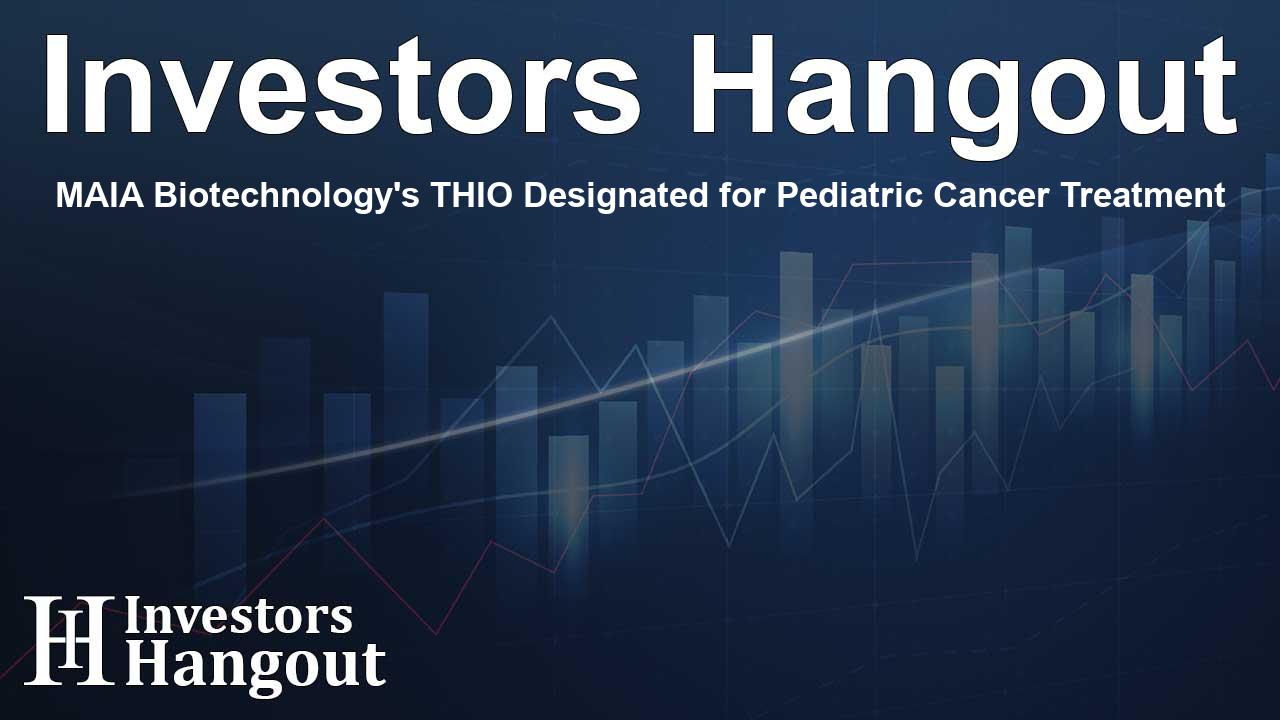MAIA Biotechnology's THIO Designated for Pediatric Cancer Treatment

MAIA Biotechnology Receives FDA Designation for THIO
MAIA Biotechnology, Inc., a clinical-stage biopharmaceutical firm focused on innovative therapies for cancer, recently announced that the FDA has granted THIO a special designation as a treatment for pediatric-type diffuse high-grade gliomas (PDHGG). This designation is significant as it recognizes THIO as a drug aimed at treating a rare pediatric disease, aimed at children facing one of the most resistant forms of cancer.
Understanding THIO's Unique Role in Cancer Treatment
THIO is identified as a versatile anti-cancer agent known for its ability to produce positive outcomes across various challenging cancer types. Pediatric high-grade glioma, a particularly hard-to-treat cancer, has been a focal point of MAIA's ongoing research. Vlad Vitoc, M.D., the Chairman and CEO of MAIA, expressed pride in securing the FDA’s Rare Pediatric Disease designation, enhancing the company’s ongoing research strategy for THIO.
The Strategic Benefits of FDA Designation
The Rare Pediatric Disease designation brings more than just recognition; it offers exceptional value to MAIA. K. Robinson Lewis, Vice President and Head of Regulatory and Quality, elaborated on this by stating that upon FDA approval of both THIO and a future new drug application in PDHGG, the company would qualify for a priority review voucher. Such vouchers can be exchanged for the fast-tracked review of another product, making them crucial assets often valued up to $100 million.
Research and Development of THIO
Previous studies have highlighted THIO's effectiveness as a treatment for DIPG, a subtype of PDHGG. Research in collaboration with Nationwide Children's Hospital demonstrated that pairing THIO with ionizing radiation could significantly reduce cell proliferation in aggressive DIPG cases. The promising results were showcased at a major cancer research conference, indicating a robust research trajectory for THIO.
Collaboration for Progress
MAIA worked alongside Only Orphans Cote to facilitate the designation of THIO. This collaboration is essential as Only Orphans Cote specializes in regulatory strategies pertaining to orphan drug designations and marketing approvals, thus enhancing the prospects for THIO in the competitive biopharmaceutical landscape.
THIO's Broader Implications in Oncology
Beyond its designation in pediatric cases, THIO has also earned orphan drug designations in multiple cancer types including hepatocellular carcinoma, small cell lung cancer, and glioblastoma. This positions THIO uniquely as it is the only known direct telomere-targeting agent currently undergoing clinical trials.
About THIO
THIO (6-thio-dG or 6-thio-2’-deoxyguanosine) represents a first-in-class investigational agent concentrating on telomeres, vital components for cancer cell survival. This innovative drug modifies telomerase-dependent telomeric DNA, which leads to DNA damage responses and cancer cell death. THIO effectively activates both innate and adaptive immune responses, suggesting a dual action against cancer cells. With ongoing studies focusing on its use in Non-Small Cell Lung Cancer (NSCLC), THIO is being developed as a second or later treatment line for patients unresponsive to standard therapies.
About MAIA Biotechnology, Inc.
MAIA Biotechnology is dedicated to advancing immuno-oncology therapies with the aim of significantly enhancing patient survival rates through innovative cancer treatments. The firm is focused on developing drugs with unique mechanisms intended to address diverse cancer types. Their leading candidate, THIO, is currently being studied for its potential effectiveness against NSCLC, targeting telomerase-positive cells to provide a new pathway in cancer therapy.
Frequently Asked Questions
What is THIO?
THIO is a novel investigational drug designed to target telomeres, aiming to induce cancer cell death through innovative mechanisms related to DNA repair and immune response activation.
What designation has THIO received from the FDA?
THIO has been granted the Rare Pediatric Disease designation by the FDA, allowing it to be recognized as a significant treatment option for pediatric high-grade gliomas.
What are the benefits of the FDA's Orphan Drug Designation?
This designation provides incentives, including potential eligibility for priority review vouchers, which can expedite the review process for additional drugs developed by MAIA.
How effective is THIO in treating various cancers?
Research has shown that THIO is effective in decreasing cell proliferation and producing strong anticancer effects, particularly in challenging cases like DIPG and NSCLC.
What is the main goal of MAIA Biotechnology?
MAIA aims to improve and extend the lives of individuals with cancer through the development of first-in-class drugs targeting novel mechanisms in cancer treatment.
About Investors Hangout
Investors Hangout is a leading online stock forum for financial discussion and learning, offering a wide range of free tools and resources. It draws in traders of all levels, who exchange market knowledge, investigate trading tactics, and keep an eye on industry developments in real time. Featuring financial articles, stock message boards, quotes, charts, company profiles, and live news updates. Through cooperative learning and a wealth of informational resources, it helps users from novices creating their first portfolios to experts honing their techniques. Join Investors Hangout today: https://investorshangout.com/
Disclaimer: The content of this article is solely for general informational purposes only; it does not represent legal, financial, or investment advice. Investors Hangout does not offer financial advice; the author is not a licensed financial advisor. Consult a qualified advisor before making any financial or investment decisions based on this article. The author's interpretation of publicly available data shapes the opinions presented here; as a result, they should not be taken as advice to purchase, sell, or hold any securities mentioned or any other investments. The author does not guarantee the accuracy, completeness, or timeliness of any material, providing it "as is." Information and market conditions may change; past performance is not indicative of future outcomes. If any of the material offered here is inaccurate, please contact us for corrections.